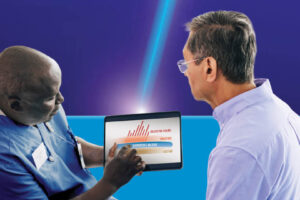When you first hear “EBUS,” you may think it’s a mode of transportation to take to work or to get into town. In health care, however, the term refers to endobronchial ultrasound (EBUS) bronchoscopy. While it may not get you from here to there, it provides an effective route for pulmonologists to steer directly to the source of an illness, such as lung or lymph node cancers.
An EBUS bronchoscopy procedure is one of the quickest and most precise ways to diagnose lung cancer for those in a high-risk category, such as smokers or people over the age of 65, or those who have had abnormal-looking lymph nodes detected on radiological scans. This specialized procedure is an important step in CentraState’s journey to establish an advanced bronchoscopy program within a comprehensive lung cancer center.
“Doctors always ask patients, ‘have you had a mammogram?’ or ‘did you get a colonoscopy?’” says CentraState pulmonologist Rajagopalan Rengan, DO. “Like those tests, an EBUS bronchoscopy helps us find cancer in a much earlier stage. It does the exact same thing a colonoscopy does for colon cancer detection, but for lungs. It is interventional pulmonology.”
Prior to an EBUS bronchoscopy procedure, patients may require bloodwork. The day of the procedure, patients receive sedation and a physician gently guides an EBUS scope with a video camera and ultrasound device through the mouth and windpipe to the lungs and lymph nodes. The instrument is similar to that used in a colonoscopy; however, an EBUS scope is smaller, and its scope is even more flexible.
In the past, screenings have been limited to the airway. EBUS bronchoscopy goes beyond the airway to provide a safe way to better see the lymph nodes and lungs. To achieve the most accurate results, the camera and ultrasound device take images of the lungs and lymph nodes to evaluate areas that may not be seen with scans or X-rays. EBUS enables the physician to obtain an image-guided biopsy while minimizing the risk of complications.
When the procedure is completed, patients may return home after a brief observation period. EBUS bronchoscopy is a relatively simple and painless outpatient procedure, but an important one, as it can determine early stages of disease.
Although lung cancer is the second most common cancer in both men and women, screening for this disease is not as prevalent as screenings for other types of cancer, according to Dr. Rengan. That’s why he is so excited to spread the word about CentraState’s EBUS bronchoscopy procedure.
“With innovative procedures like EBUS bronchoscopy, we can detect cancers in a much earlier stage,” Dr. Rengan says. “It’s just another way that CentraState is working to prove itself to be one of our region’s most comprehensive cancer facilities.”
Learn more about the Statesir Cancer Center at CentraState at centrastatecancercenter.com or 855-411-CANCER (855-411-2262).





